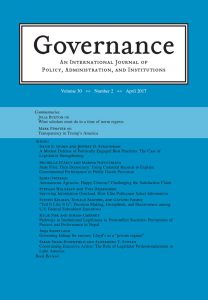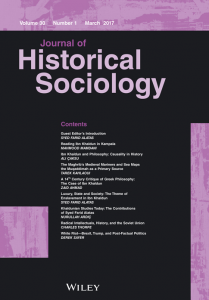Education: Building Health and Human Capital
 In a recent article in The Sociological Quarterly, Catherine E. Ross and John Mirowsky of the University of Texas explored the relationship between gender and education in terms of improving health. The two hypothesized that education improves health more for women than men and set out to prove this point through the theory of resource substitution. Essentially, resource substitution implies that any one individual can have multiple resources at their disposal that can contribute to and develop their human capital. In the context of this discussion, human capital is defined as the “productive capacity developed, embodied, and stocked in human beings themselves.” Of course, existing social barriers can often limit which resources an individual can count towards the development of their human capital.
In a recent article in The Sociological Quarterly, Catherine E. Ross and John Mirowsky of the University of Texas explored the relationship between gender and education in terms of improving health. The two hypothesized that education improves health more for women than men and set out to prove this point through the theory of resource substitution. Essentially, resource substitution implies that any one individual can have multiple resources at their disposal that can contribute to and develop their human capital. In the context of this discussion, human capital is defined as the “productive capacity developed, embodied, and stocked in human beings themselves.” Of course, existing social barriers can often limit which resources an individual can count towards the development of their human capital.
In the article, Ross and Mirowsky focus on women’s disadvantaged ascribed status. In their theory resource substitution exists when having multiple resources makes outcomes less dependent on the presence of any one specific resource. The authors note that, “compared with men, women face more economic dependency, restricted opportunities for paid employment, routine, poorly paid, and unfulfilling work, and less authority at work.” Therefore, in terms of resources that can contribute to the improvement or safeguarding of health women lack some of the resources of men and must depend more heavily on education.
This more concentrated dependence on education because of resource substitution draws the authors to their conclusion that gender is a significant factor when it comes to health benefits as a result of education. As a counterweight to their theory, Ross and Mirowsky introduce the idea of reinforcement of advantage. In this theory, those who have greater resources benefit from them exponentially by relaying on all of their advantages equally. In the same vein, those who have fewer resources, suffer proportionately.
The results of their study found that the theory of resource substitution was, in fact, legitimate and that women do benefit in a greater number from health education than men. They did find, however, that this is only true with real significance in individuals with less economic advantage. The health gap between men and women with a higher education is small and continues to close whereas those with a lower level of education continue to suffer at a higher rate.
The authors use this evidence to draw parallels to the work of social scientists and economists who explore global economic development and the importance of education in these contexts. However in times of economic hardship when the poor in even the wealthiest of nations are brought to the forefront of daily conversation, it is interesting to see how the importance of education is universal.
On February 9, Mrs. Obama officially launched a program aimed at attacking childhood obesity (which can lead to a variety of other health problems such as heart disease, high blood pressure, diabetes, cancer and asthma) in the United States. In a politically savvy move during a time where the president and his party are viewed as drastically broadening the role of the government, the First Lady’s new plan does not attack the behavior of parents or children as this would be seen as government meddling in private lives. However, this has led her to adopt an approach which focuses on the overall environment that children live and learn in. Not only will school lunches begin to resemble more healthy fare, but professional athletes have committed to public service announcement, green grocers will be installed in inner cities, and safe walking routes will be designed to encourage children to travel to school on foot. Mrs. Obama’s message is one of moderation and education which has targeted approaches to help kids who grow up with disadvantage. This approach may add several resources to the development of the human capital of America’s youth.





1475-6781/asset/JSS.gif?v=1&s=377bb8e0c3d0fcf201f301ded7cf610142072c3e)

I wonder if resource substitution is also stimulating critical thinking? Engaging in critical thinking about food choices seems to be quite necessary, given all of the mixed messages that are present in advertising and the media. Just yesterday the Boston Globe had a post about “good” fast food, which I think turned out to be about good tasting fast food rather than good for your body fast food. If people have access to more information, they can begin to learn and ask questions that might not occur to them otherwise. This would also explain the closeness to parity among well educated men and women, as compared to poorly educated men and women. I do hope that Mrs. Obama’s program will encourage children to start thinking about food choices–without blaming the victim.
Keri
I think this program launched by Mrs. Obama is particularly important in our current society. With the affordability and convenience of fast food, it’s no wonder that people have begun to consume these unhealthy foods so readily. Childhood obesity has become such a prevalent issue in our society today and we need to begin implementing programs that can teach kids and parents alike how to lead more healthy lifestyles. I think implementing this program into schools is a great first step. By targeting kids to begin eating healthy foods and to exercise regularly, these ideas and knowledge can hopefully stay with them and carry on into their adult lives. Not only is it important to teach the benefits and importance of eating healthy food and leading healthy lifestyles, but I think it’s also important to teach them how to prepare these foods. Often times, families know which foods are good for them, but in terms of preparing a meal that everyone likes, they may not know how to go about cooking healthy meals. In this way, creating food preparation courses in schools that teach ways to cook healthy meals could also be a helpful tool.
Food is something we don’t often think about critically. We know we need it to survive, we have a sense of what types of food are good or bad for us, but we don’t really have much knowledge of what food consists of in terms of what it’s made of or where it comes from. I think it’s important that we begin to become more aware of the types of food that we eat. This knowledge is especially important to know as it contributes to our well-being as individuals and as a society.
Focusing on helping disadvantaged communities and youth first is also an important measure that was noted. Organic and healthy food is typically more expensive, so it’s even more imperative to teach impoverished families and communities which foods are healthier and also affordable to eat since they may not have the luxury to buy the finest foods. Overall, I think becoming more educated about our food will help us as a nation to begin leading healthier lifestyles.
I think this program launched by Mrs. Obama is particularly important in our current society. With the affordability and convenience of fast food, it’s no wonder that people have begun to consume these unhealthy foods so readily. Childhood obesity has become such a prevalent issue in our society today and we need to begin implementing programs that can teach kids and parents alike how to lead more healthy lifestyles. I think implementing this program into schools is a great first step. By targeting kids to begin eating healthy foods and to exercise regularly, these ideas and knowledge can hopefully stay with them and carry on into their adult lives. Not only is it important to teach the benefits and importance of eating healthy food and leading healthy lifestyles, but it’s also important to teach them how to prepare these foods. Often times, families know which foods are good for them, but in terms of preparing a meal that everyone likes, they may not know how to go about cooking healthy meals. In this way, creating food preparation courses in schools that teach ways to cook healthy meals could also be a helpful tool.
Food is something we don’t often think about critically. We know we need it to survive, we have a sense of what types of food are good or bad for us, but we don’t really have much knowledge of what food consists of in terms of what it’s made of or where it comes from. I think it’s important that we begin to become more aware of the types of food that we eat. This knowledge is especially important to know as it contributes to our well-being as individuals and as a society.
Focusing on helping disadvantaged communities and youth first is also an important measure that was noted. Organic and healthy food is typically more expensive, so it’s even more imperative to teach impoverished families and communities which foods are healthier and also affordable to eat since they may not have the luxury to buy the finest foods. Overall, I think becoming more educated about our food will help us as a nation to begin leading healthier lifestyles.